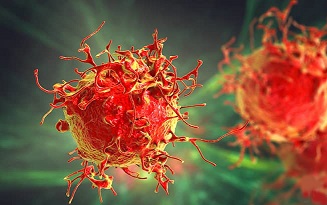Scientists From Portugal Find That Diminished Peripheral CD8+β7 Integrin+ T Cells And Anti-SARS-CoV-2 IgA Response Characterizes Long COVID
Long COVID - Diminished Peripheral CD8+β7 Integrin+ T Cells Mar 31, 2023 2 years, 10 months, 3 weeks, 6 days, 3 hours, 4 minutes ago
Long COVID: A new study led by researcher from University of Minho, Braga-Portugal and Hospital of Braga-Portugal has found that diminished peripheral CD8+β7 integrin+ T cells and anti-SARS-CoV-2 IgA response characterizes Long COVID.

It has been estimated that several millions of individuals worldwide are likely to experience
Long COVID, a condition that continues to affect patients for months after their initial bout with the virus.
Several hypotheses have been proposed to explain the development of Long COVID or post-acute sequelae of SARS-CoV-2 infection (PASC), including long-term tissue repair from extensive damage caused by the virus, persistence of the virus in the body, and autoimmune phenomena. Chronic immune activation due to these factors has been linked to Long COVID.
The study team investigated the possibility that chronic immune dysregulation characterizes Long COVID. The researchers examined T cell immunophenotyping, viral-specific antibody response, and cytokine signatures of individuals who have recovered from COVID-19 and are experiencing Long COVID, to those of convalescent asymptomatic individuals as well as uninfected participants. This comparison was carried out six months after the COVID-19 diagnosis of the affected individuals.
Results show that immune activation, especially in CD8+ T cells, is present in convalescent patients regardless of Long COVID development. Distinct profiles of type I and mucosal type III interferons are observed in patients compared to uninfected individuals.
In both convalescent asymptomatic individuals and those suffering from Long COVID, the study team observed an increased percentage of CD8+ T cells, which are crucial for fighting viral infections. However, there was a noticeable difference when it comes to the proportion of blood CD8+ T cells expressing the mucosal homing receptor β7; this proportion was significantly lower in long COVID patients.
Long COVID patients exhibit higher levels of CD8+ T cells expressing the transcription factor Eomes.
Additionally, it was found that the CD8 T cells in Long COVID patients exhibited heightened expression of PD-1, perforin, and granzyme B, which are molecules involved in the immune response to infections.
Furthermore, the study team observed elevated plasma levels of type I and type III (mucosal) interferons, which are proteins that play a critical role in the immune response against viruses.
The humoral response, which involves the production of antibodies, is characterized by increased levels of immunoglobulin A (IgA) against the N and S viral proteins of SARS-CoV-2. This increase is particularly evident in individuals who experienced severe acute COVID-19 disease. Consistent with a mucosal immune response, specific immunoglobulin A (IgA) directed against the N and S proteins of SARS-CoV-2 were detected in Long COVID individuals. These findings suggest that the persistence of viral antigens in mucosa may alter the mucosal immune response, potentially contributing to the development of Long COVID.
The study findings were published in the peer reviewed journal: Natur
e Communications.
https://www.nature.com/articles/s41467-023-37368-1
The study findings revealed that persistently high levels of interleukin-6 (IL-6), interleukin-8/CXCL8, and interferon gamma-induced protein 10/CXCL10 during the acute phase of the disease are associated with an increased risk of developing Long COVID. These molecules are involved in the activation and regulation of immune responses.
This study investigated the immune activation and dynamics of CD4+ and CD8+ T cells in individuals recovering from COVID-19. It finds that CD8+ T cells show higher levels of immune dysregulation than CD4+ T cells, with some immune alterations persisting longer than initially expected. CD8+ T cells remain activated six months after infection, presenting higher levels of perforin and Eomes expression in individuals with Long COVID.
The study also reveals a decrease in the CD8+ β7 Integrin+ T cell population in the blood of Long COVID individuals, along with higher levels of IFN-λ2/3 and specific IgA antibodies against SARS-CoV-2 antigens. Retrospective analysis of patients' plasma during the early phase of infection shows that the extent of inflammation is associated with later Long COVID symptoms.
The research suggests that the persistence of SARS-CoV-2 in mucosal tissues might be a key factor contributing to Long COVID, as evidenced by the presence of specific anti-S IgA and higher levels of IFN-β and IFN-λ in PASC patients. Furthermore, the study highlights the importance of monitoring immune parameters related to SARS-CoV-2 infection for better diagnosis and treatment of Long COVID.
However, the study had certain limitations, including its exploratory nature, reliance on symptom reports for diagnosis, and the need for further research to confirm viral persistence in mucosa. Nevertheless, the findings provide valuable insights into the immune mechanisms associated with Long COVID and potential treatment strategies targeting viral persistence.
In conclusion, this comprehensive study demonstrates that Long COVID is characterized by ongoing immunological dysfunction up to six months after SARS-CoV-2 infection. This dysfunction includes changes in mucosal immune parameters, a redistribution of mucosal CD8+β7 Integrin+ T cells, and elevated levels of IgA, all of which suggest potential viral persistence and mucosal involvement in the etiopathology of Long COVID.
These study findings contribute significantly to the understanding of the long-term effects of COVID-19 and may inform future treatment strategies and interventions for those suffering from Long COVID.
For the latest on
Long COVID, keep on logging to Thailand Medical News.
